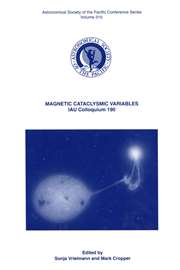No CrossRef data available.
Article contents
Main Sequence Abundances: Observational Aspects
Published online by Cambridge University Press: 12 April 2016
Abstract
Although once it was thought that main-sequence stars are remarkably homogeneous with respect to their chemical composition, the upper main-sequence stars (30000 > Te > 7000) show a variaety of chemically peculiar stars besides the so-called normal stars. Those include the Am, Ap, λ Bootis, He-deficient, and He-rich stars. This review summarizes the current data, which are necessary to construct and test the theoretical models of these stars. In the second half of the review we concentrate on Li. In the lower main-sequecnce stars abundances of Li have been determined in hundreds of stars. Some of the remarkable results are: (1) A uniform upper abundance value irrespective of stellar effective temperature, (2) abundance gap in the F stars of the Hyades, and (3) increasing depletion with smaller stellar mass for the Hyades.
Information
- Type
- Part I. Chemical Peculiarities as Probe of Stellar Evolution
- Information
- Copyright
- Copyright © Springer-Verlag 1988

